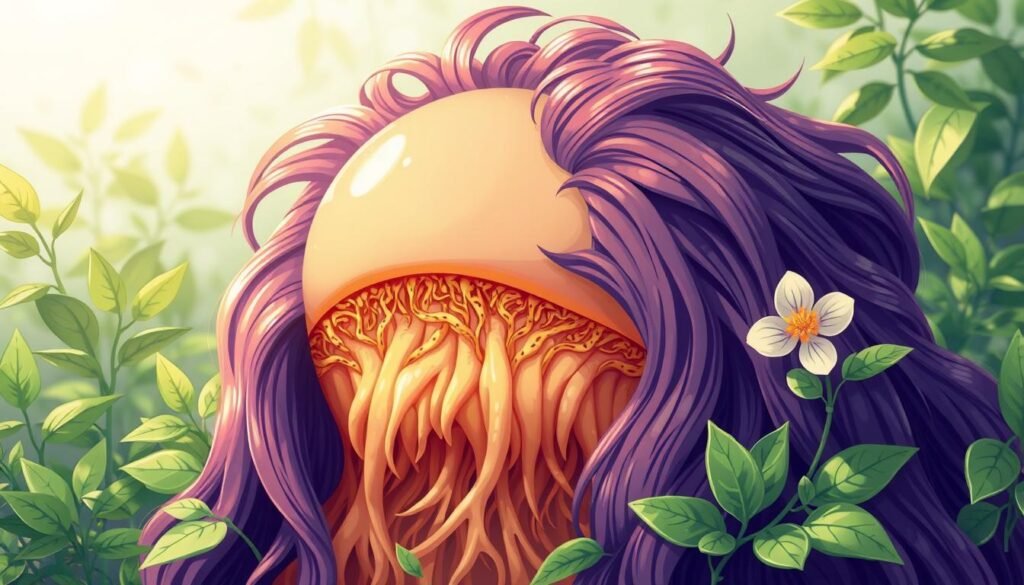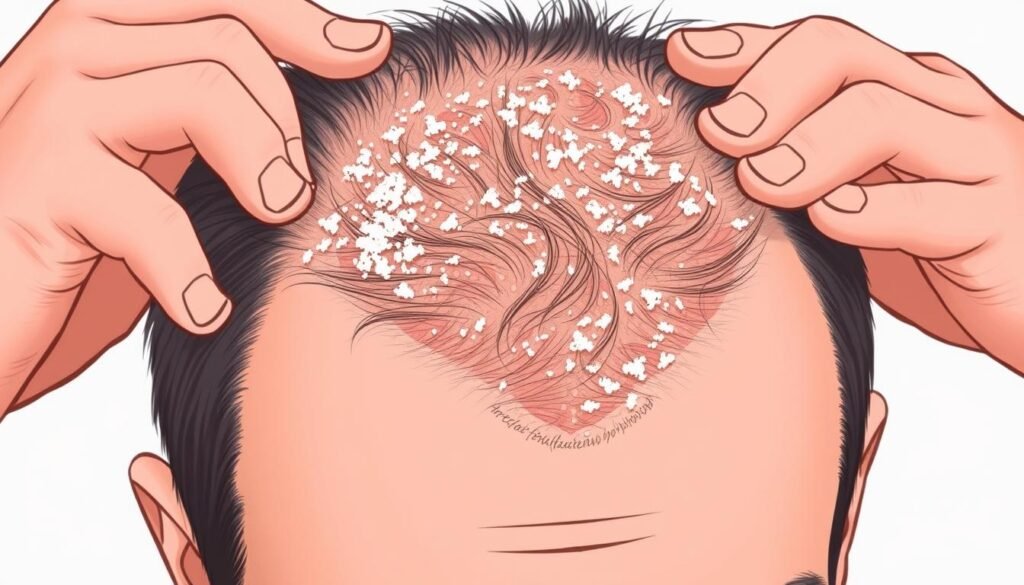Did you know that about half of all people will get dandruff at some point? Even though it’s common, many don’t realize its impact on hair. Dandruff is more than a cosmetic issue. It could signal problems that change the scalp’s condition and affect hair health.
We’re diving into how dandruff and hair growth are linked in this article. We’ll look at why dandruff happens, its effect on hair roots, and how it impacts scalp health. You’ll learn how dandruff can hurt or heal your hair. This insight shows the signs, solutions, and ways to keep a healthy scalp for better hair growth.
Key Takeaways
- Dandruff affects a significant portion of the population, making understanding its effects important.
- It may lead to hair-related issues that extend beyond mere flakes.
- The scalp’s microenvironment plays a vital role in overall hair health.
- Understanding the link between dandruff and hair loss can help in addressing treatment options.
- Proper scalp care can enhance hair growth and minimize dandruff symptoms.
Introduction to Dandruff and Hair Growth
Dandruff is a common scalp problem, affecting about half of adults sometime in their lives. It can start a chain reaction that slows down hair growth. Dandruff does not cause hair loss by itself. However, it’s linked with conditions that lead to thinning hair and breakage. Dandruff signs can show inflammation, which weakens hair follicles and slows hair growth.
People with seborrheic dermatitis often see their hair thinning. This issue gets worse due to a weak immune system, some medicines, and stress. The fungus Malassezia contributes to poor scalp health by weakening hair roots. Severe dandruff can also increase sebum production, blocking hair follicles and creating a dry, flaky scalp.
To keep a healthy scalp and promote hair growth, treating dandruff is crucial. There are medicated shampoos with ingredients like selenium sulfide and ketoconazole to fight dandruff. Treatments like mesotherapy boost blood flow, helping hair grow back. For serious hair loss, a hair transplant could be the answer.
Understanding Dandruff: What Causes It?
Dandruff is a frustrating condition where your scalp sheds too many skin cells. This leads to noticeable flakes in your hair. A major cause of dandruff is a dry scalp, which gets worse in cold weather. This dryness helps a fungus named Malassezia grow.
Malassezia is normally found on our scalps. But it can cause problems when it feeds on the oils there. This leads to inflammation and more flakes.
There are several things that can trigger dandruff, such as:
- Dry skin or scalp
- Seborrheic dermatitis, which causes redness and flakes
- Allergic reactions to hair care products
- Psoriasis, which can exacerbate flaking
Living a healthy lifestyle plays a big part in keeping dandruff away. Eating foods rich in omega-3, zinc, and vitamins supports scalp health. Also, washing your scalp regularly with the right products can reduce residue that may worsen dandruff.
To tackle scalp conditions, we need to understand their causes. Using treatments against Malassezia can help a lot. However, everyone is different. The right care depends on the person’s specific dandruff triggers.
For more tips on keeping your hair healthy, check out this great resource.
Does Dandruff Affect Hair Growth?
Dandruff is a common problem that worries many people about their hair health. The condition leads to flaky skin on the scalp. It can make hair follicles weak and cause scalp irritation. This often leads to hair breaking more easily.
The Link Between Dandruff and Hair Health
Studies show dandruff itself doesn’t make hair fall out. But, the itchiness and inflammation that come with it can harm your scalp. Scratching a lot can hurt the scalp and hair follicles. Over time, this can make hair weaker and prone to breaking.
Even though hair might grow at its regular speed, it can break easily. This is because of the inflammation weakening it.
Inflammation and Its Effects on Hair Follicles
Severe dandruff can hurt hair growth by causing inflammation. This bad environment on the scalp can block new hair from coming through. Scars from long-term inflammation can be a big problem. It’s important to tackle dandruff early on to keep hair follicles healthy. Taking care of dandruff helps your scalp and hair stay healthy.
Impact of Scalp Health on Hair Growth
A healthy, lively scalp is key for good hair growth. Blood flow, the scalp’s condition, and helpful microbes are important. It’s vital to take care of your scalp to have quality hair.
How a Healthy Scalp Promotes Stronger Hair
Your scalp needs to be healthy to boost hair growth. Good blood flow brings essential nutrients to hair roots. This makes hair strong and good-looking. By keeping a healthy scalp, you can see:
- Less hair breakage and loss
- A balanced amount of sebum that keeps hair protected and moist
- Better hair thickness and texture
Scalp massages and regular hair washing remove buildup and control oil. Eating foods rich in Vitamin E, omega-3s, and biotin is also key. They help keep your scalp and hair healthy and fight off stress that weakens hair.
The Role of Microbes in Scalp Conditions
Good microbes are essential for a healthy scalp. They protect against bad bacteria and fungi, like Malassezia. If the scalp’s microbial balance is off, issues like dandruff can appear. This blocks hair follicles, affecting growth.
Using the right scalp care products helps keep a healthy microbial balance. This leads to:
- Faster hair growth
- A healthier scalp
- Less inflammation that blocks hair follicles

To sum up, knowing how to keep your scalp healthy is crucial for hair growth. Understanding the scalp’s microbiome and its role in hair health helps. By taking care of the scalp’s basic health, your hair will stay strong, bright, and tough.
Common Conditions Associated with Dandruff
Dandruff is tied to several scalp issues that cause discomfort and risk of hair loss. Knowing about these conditions helps pick the right treatments. This way, you can better control symptoms.
Fungal Infections and Their Effects
Fungal issues, especially tinea capitis, play a big part in dandruff. This infection leads to a lot of itching and an inflamed scalp. This results in flakes and sometimes, hair loss. It’s key to manage this properly to avoid harm to hair follicles.
Seborrheic Dermatitis: A Main Contributor
Seborrheic dermatitis stands out as a leading cause of dandruff. It shows up as red, greasy spots on the scalp and elsewhere. Without quick action, it can get worse. The linked inflammation might make dandruff worse and cause hair to thin over time.
The Connection Between Psoriasis and Hair Loss
Scalp psoriasis is a major issue tied to dandruff-like signs. The skin gets scaly and red, bothering the scalp more. This worsens inflammation and can lead to hair loss. It’s crucial to know that psoriasis and dandruff may look similar but need different treatments to protect hair follicles.
| Condition | Dandruff Symptoms | Impact on Hair |
|---|---|---|
| Fungal Infections (Tinea Capitis) | Itching, inflammation, flakes | Possible hair loss if untreated |
| Seborrheic Dermatitis | Greasy flakes, redness | May lead to hair thinning |
| Psoriasis | Red patches, scaling | Can cause hair loss with severe inflammation |
Knowing about these issues is crucial for early detection and care. For more info, dandruff research offers deep insights. It helps understand scalp health and its effect on hair growth.
Symptoms of Severe Dandruff and Related Hair Loss
Dandruff is more than just an unsightly nuisance. It can also lead to severe symptoms that affect scalp health and hair presence. Scratching because of itchiness can harm hair follicles, leading to hair loss. It’s vital to understand these complications if you’re concerned about your hair health.
Scratching and Its Impact on Hair Health
Too much scratching can damage your scalp and disrupt hair follicles. This habit can worsen the irritation. As a result, inflammation from scratching might cause more hair thinning. The follicles may not support healthy hair. It’s crucial to check your scalp health often and use gentle methods to lessen itching.

Identifying Signs of Hair Thinning
Though dandruff might not directly cause hair loss, spotting signs of hair thinning is key. Seeing more hair fall during washing or styling can mean there’s a problem. Conditions like telogen effluvium, triggered by inflammation, can make hair loss worse. Catching these signs early helps in tackling the issues quickly.
Adding good scalp care and lifestyle changes helps keep a healthy scalp. Eating well and managing stress supports treatment. For more advice, check out prevention tips to fight dandruff and boost scalp health at this link.
| Symptoms | Possible Complications |
|---|---|
| Itchy scalp | Scalp damage from scratching |
| Visible flakes | Increased hair thinning |
| Persistent inflammation | Hair breakage |
| Increased hair fall | Telogen effluvium |
Effective Dandruff Treatments
Finding the right anti-dandruff product is very important. Look for ingredients like ketoconazole, zinc pyrithione, and salicylic acid. These help reduce dandruff and make the scalp healthier. For example, Nizoral uses ketoconazole. It should be used twice a week for eight weeks for best results.
Choosing the Right Anti-Dandruff Products
It’s good to check out anti-dandruff shampoos with 2% ketoconazole. Sometimes they work better than those you can buy without a prescription with 1% ketoconazole. Doctors say you can use these shampoos for a long time without any bad side effects. They can even help prevent hair loss by reducing scalp inflammation. To learn more, check out this article.
Home Remedies versus Commercial Solutions
Many people like using home remedies like tea tree oil and apple cider vinegar for a natural approach. These can be softer on your scalp compared to store-bought treatments. But store treatments are designed to quickly deal with dandruff. Choosing between them mostly depends on what you prefer and your scalp’s needs. Eating well and living a healthy lifestyle can also help improve your scalp and hair.
Prevention Strategies for Dandruff
Learning how to stop dandruff is key to keeping your hair and scalp healthy. Good scalp hygiene and smart lifestyle changes can greatly lower your chances of flaking and itching.
Maintaining Scalp Hygiene
Washing your hair regularly is vital for daily hair care. It helps prevent too much oil and reduces dandruff risk. Using special dandruff shampoos can tackle any fungal causes. Always follow the directions, like leaving the shampoo on for a bit. This lets the shampoo’s active ingredients do their job.
Diet and Lifestyle Adjustments
What you eat matters a lot for scalp health. Foods high in vitamins, minerals, and fatty acids help your scalp stay strong. For example, omega-3s are good for your skin and could help your hair, too. Drinking plenty of water is also crucial to avoid a dry, itchy scalp which makes dandruff worse.
- Include foods rich in zinc and B vitamins.
- Opt for healthy fats like avocados and fish.
- Practice stress management techniques such as meditation and deep breathing.
A balanced diet for scalp health and taking care of your overall wellbeing help with hair growth and preventing dandruff.

| Factor | Recommendation |
|---|---|
| Scalp Hygiene | Wash regularly with anti-dandruff shampoo. |
| Diet | Eat foods high in zinc, omega-3s, and vitamins. |
| Lifestyle Changes | Implement stress relief practices. |
| Hydration | Drink enough water daily. |
Putting these strategies first helps you take better care of your scalp and hair.
When to See a Dermatologist
If you’re dealing with dandruff, it’s key to keeping your hair healthy. Sometimes, home care just doesn’t cut it, and the dandruff sticks around. This could mean a bigger issue is at play. A dermatologist can look closely at your scalp. Understanding when to get a doctor involved can make a big difference in handling hair issues.
Recognizing Persistent Dandruff Issues
Long-term dandruff is a red flag that you might need more than just over-the-counter fixes. Key symptoms that a specialist’s insight is needed include:
- Ongoing flaking and itchiness despite home remedies
- Redness or inflammation of the scalp
- Increased hair loss or thinning observed over time
- Development of painful sores or lesions on the scalp
These symptoms suggest that your dandruff is not just dandruff. It could be something that needs specific care.
Conditions That Require Professional Attention
Some scalp issues need a doctor’s look because they affect hair growth and scalp health. These issues include:
| Condition | Description | Necessity for Treatment |
|---|---|---|
| Seborrheic Dermatitis | A chronic skin condition causing flaky scales and persistent dandruff. | Requires targeted medication for effective management. |
| Psoriasis | It speeds up skin cell growth, leading to scaling. | Needs specialized therapies to alleviate symptoms. |
| Tinea Capitis | This is a fungal infection of the scalp, common in kids. | Requires antifungal treatment to prevent hair loss. |
| Cicatricial Alopecia | A rare, inflammatory condition that destroys hair follicles. | Needs immediate intervention to halt progression. |
Seeing a dermatologist on time is crucial for dealing with any problems that might harm your hair or scalp health.
Conclusion
Understanding the link between dandruff and healthy hair is key for anyone with a flaky scalp. Dandruff doesn’t directly cause hair to fall out. But, it’s tied to factors that may slow hair growth.
When your scalp gets inflamed and itchy, scratching a lot can harm hair roots. This might lead to thinner hair. So, it’s vital to treat dandruff to keep hair healthy.
To help hair grow and prevent hair loss, managing dandruff well is a must. Use anti-dandruff shampoos regularly, keep your scalp moist, and clean well. Eating well, rich in vitamins and minerals, also boosts scalp health. Check out more tips here.
Being active in treating dandruff helps ease symptoms and is good for your hair’s health. Spotting scalp problems early and getting the right treatment helps. This way, your hair can grow well and stay strong.